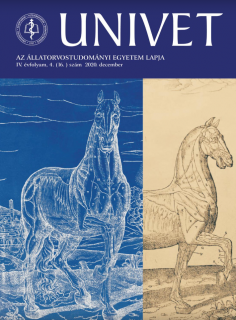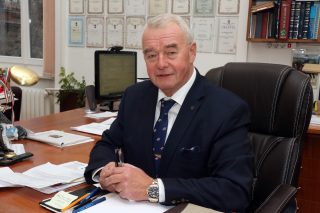241 presentations were held in the Section’s 27 branches. The professional jury granted 80 places and 40 special awards.
News
Student Welfare Committee president Zoltán Danyi: “I miss going to the university”
As a little boy, he herded animals, learnt folk dancing and playing the trumpet – despite the fact that he grew up in the inner city of Debrecen. Although his genetic inheritance ties him to the Carpathian mountains, it’s the Hortobágy that amazes him the most. He is a fourth-year veterinary student Zoltán Danyi who wants to be involved in food animal healthcare after graduation.

VETATHON – creative solutions in the idea marathon
Excellent ideas were presented in the fantastically well-received VETATHON idea contest jointly organized by the University of Veterinary Medicine Budapest and Óbuda University with the theme “Animals and the pandemic”.
World’s 5th equine CT scanner inaugurated in the Üllő Campus
The Department and Clinic of Equine Medicine of the University of Veterinary Medicine Budapest has gained a CT scanner that is one of only five in the entire world.
Online UNIVET Job Fair was a great success
In spite of the pandemic situation, it was not subject to question that the IV. Hungarian and International Job Fair would be organized by the University of Veterinary Medicine Budapest.
VetaThon – exciting intellectual competition organized by UVMB and Óbuda University
What is this about? You are invited to an exciting intellectual competition, where we are looking for creative and feasible solutions for real burning problems in the world. The competition will be in the form of a Hackaton. If you are not familiar with the term, this is a marathon (e.g. 24 hours) competition, where teams
UVMB opens Center for Animal Welfare
Animal welfare research and education has reached another major milestone at the University of Veterinary Medicine Budapest. The newly-established Legal, Analytical and Methodological Center for Animal Welfare at the University of Veterinary Medicine Budapest (in short, UVMB Center for Animal Welfare) aims to provide the scientific background for the theory and practice of animal welfare.
Educatio International Education Expo was held online
This year the Educatio International Education Expo was held online between 21th and 23rd of January. The University of Veterinary Medicine Budapest appeared at the virtual event with a unique digital stand to present the current courses, training opportunities.
The new issue of Univet magazine is now available
In the fourth issue of our magazine, which closes the year of 2020, you can read about the most important news of the Rector’s Secretariat, the candlelight commemoration at the end of October, the Marek Days and about the events which were placed in the online space because of the pandemic: the Scientific Student Conference and the Open day.

Marek József Foundation offers unprecedented opportunity: Conversation with UVMB Rector Dr. Péter Sótonyi
2020 has been an extraordinary year in UVMB’s life too, but the education programme, which is always the university’s top priority, still went on according to the Rector’s newly developed protocol partly based on the students’ requests. Here’s the English summary of our interview with our Rector, Dr. Péter Sótonyi.

